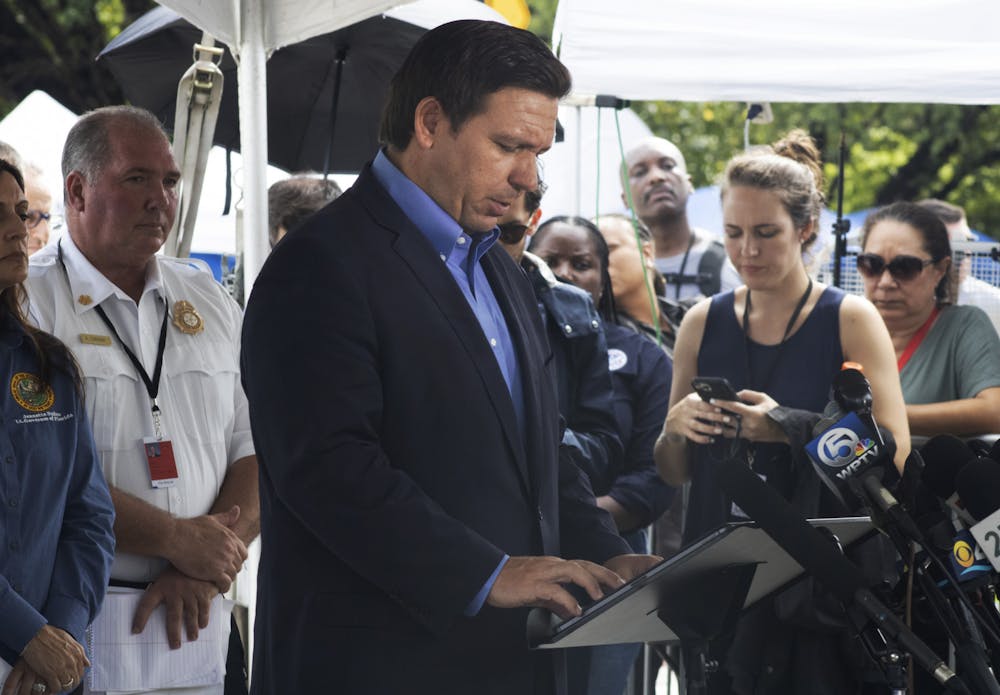A new Florida law will assess political and ideological diversity on campus through yearly surveys.
House Bill 233 was signed by Gov. Ron DeSantis June 22 and went into effect July 1. In the survey, students, faculty and staff will be asked whether they feel comfortable expressing their viewpoints at Florida College System institutions.
It states both the State Board of Education and the Board of Governors may not shield students, faculty or staff from speech allowed under the First Amendment. The law defines “shield” as limiting exposure to “uncomfortable, unwelcome, disagreeable, or offensive” ideas and opinions.
As an institution that values academic deliberation, UF is a marketplace of ideas and houses a variety of opinions, UF spokesperson Cynthia Roldan wrote in an email.
“We believe the survey will reflect that, and we look forward to widespread participation across campus,” Roldan wrote.
As a public state university, UF will be affected by the law. On campus, students can be involved in a variety of political organizations representing a wide range of ideologies. Some of the biggest politically affiliated organizations include UF College Republicans and UF College Democrats. Nonpartisan groups like Democracy Matters UF are also present on campus.
Beyond the survey, the law allows students to record class lectures “for their own personal educational use,” which can be used as evidence for a criminal or civil case or to bring a complaint against the school, according to the law. However, the recording, whether audio or video, cannot be published without the speaker’s permission.
In a press conference June 22, DeSantis said universities once allowed students to be exposed to many different ideas, but today, they are “intellectually repressive environments.” While some orthodoxies are encouraged, he said others are suppressed.
“We don’t want that in Florida,” DeSantis said during the press conference. “Students should not be shielded from ideas, and we want robust First Amendment speech on our college and university campuses.”
College is advertised as a diverse environment where students from different backgrounds can learn from each other, Jackson Rowell, the external director for Young Americans for Freedom at UF, wrote in a statement.
“Intellectual freedom is a non-partisan ideal, and the students of UF deserve nothing less,” Rowell wrote. “Bill 233 protects intellectual freedom and speech, as the non-partisan survey will help to maintain a wide array of diverse viewpoints around campus.”
UF College Republicans and Turning Point USA at UF did not respond in time for publication.
To Andrew Taramykin, a 19-year-old UF political science and economics sophomore, the law seems unnecessary. He said Florida’s universities already promote intellectual diversity and freedom.
“It really just feels like Gov. DeSantis wants to put his signature on something that’ll get good coverage on Tucker Carlson, but it’s not actually solving a problem in Florida,” he said.
Looking at the faculty, on-campus organizations, classes and speakers, it's hard to argue the state’s public colleges are politically swayed in one direction, Taramykin said.
“I don’t think there’s a shortage of left or right perspectives,” he said. “I think we have a vibrant, civically engaged culture, not just at UF but at FSU and other Florida schools.”
Taramykin said the law will not have much of an effect unless the state withholds funds based on the survey’s results. However, the law is vague and leaves a lot of discretion to the Board of Governors, he said, meaning no one knows what it’ll look like in practice. It’s going to be hard to get honest feedback from faculty and students, he said.
To Taramykin, the survey seems like a waste of the government’s, students’ and teachers’ time.
“It's disheartening to see academia and government have an adversarial relationship because I think our public universities are some of the most glowing success stories of Florida state government,” Taramykin said.
It’s unfair to assume professors at liberal arts colleges are only left-leaning, Rachel Wolfrey, UF College Democrats’ public relations director, said. The 20-year-old UF political science and public relations junior mentioned Richard Spencer’s visit to UF in 2017, for example.
Wolfrey said she has met students who are conservative, liberal, moderate and extremist. She doesn’t believe students will be comfortable documenting their personal beliefs on this scale.
“This is a school where we have a pretty even playing field in terms of viewpoints,” she said.
Wolfrey said she worries about how the survey information will be used. House Bill 233 could be used as an excuse for students to use intolerable language, she said.
“If a professor is not able to step in when there’s blatant racism, sexism, homophobia, who knows what that’s going to lead to in between the students,” she said.
Contact Juliana Ferrie at jferrie@alligator.org. Follow her on Twitter @juliana_f616.

Juliana Ferrie is a second-year UF journalism student. She is excited to be working for The Alligator as the Santa Fe Beat reporter. In her free time, you can find her reading or listening to music.






